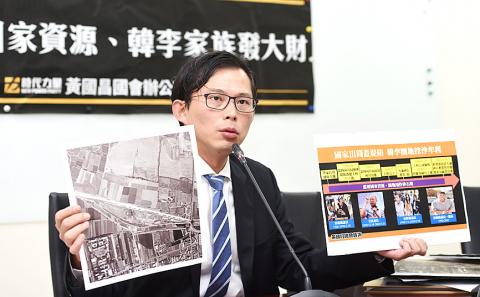New Power Party (NPP) Legislator Huang Kuo-chang (黃國昌) on Thursday evening accused Kaohsiung Mayor Han Kuo-yu (韓國瑜), the Chinese Nationalist Party’s (KMT) presidential candidate, and the family of his wife, Lee Chia-fen (李佳芬), of involvement in illegal gravel excavation along the bank of Yunlin County’s Jhuoshui River (濁水溪).
The Han-Lee family made “astounding profits by looting national resources” when Han was a KMT legislator and Lee’s father, Lee Jih-kuei (李日貴), was a Yunlin County councilor nearly two decades ago, Huang wrote on Facebook.
After receiving tip-offs, Huang said that he investigated the matter and determined that it was more outrageous than Han’s purchase of a Taipei luxury apartment worth NT$72 million (US$2.36 million).

Photo: Fang Bin-chao, Taipei Times
Later on Thursday, Han’s campaign office issued a statement denying that Han had any involvement in illegal activities, or that he used his power as a legislator for personal gain.
Politicians should debate policies and encourage progressive competition in the run-up to elections, rather than launching arbitrary attacks on a candidate’s family, it added.
At a news conference yesterday, Huang showed aerial photographs of the Siluo Bridge (西螺大橋) taken in 1994, 1999 and 2000, saying that Lee Jih-kuei had illegally excavated along the river bank for his company, Da-tong Gravel Co (大通砂石行), when he was a county councilor.
Authorities ordered a halt to the excavation, but Lee Jih-kuei was reluctant to do so, and even planned to build a gravel washing plant nearby, but dropped the plan when it was disclosed by the media, Huang said.
However, Lee Jih-kuei turned to collecting gravel near the river embankment, Huang said, questioning why government funds would be used to construct the embankment when the area was not part of an official flood prevention plan.
An embankment area would be owned by the government, but the user of that area was Lee Jih-kuei’s company, Huang said, adding that the family made illicit profits from exploiting government land.
Separately yesterday, Han said that everything should be handled through the legal process.
He said that, as a presidential candidate, he could not discuss the matter, but that his campaign office would address it.
Ye Yuan-zhi (葉元之), the spokesman for Han’s campaign headquarters, said that Huang has told a “story,” without solid proof.
Huang is manipulating a political issue, as shown by his statement yesterday that he would hold another news conference if Han’s response warranted one, Ye added.
Additional reporting by Shih Hsiao-kuang and Chen Yun

Tropical Storm Gaemi strengthened into a typhoon at 2pm yesterday, and could make landfall in Yilan County tomorrow, the Central Weather Administration (CWA) said yesterday. The agency was scheduled to issue a sea warning at 11:30pm yesterday, and could issue a land warning later today. Gaemi was moving north-northwest at 4kph, carrying maximum sustained winds near its center of up to 118.8kph and gusts of 154.8kph. The circumference is forecast to reach eastern Taiwan tomorrow morning, with the center making landfall in Yilan County later that night before departing from the north coast, CWA weather forecaster Kuan Shin-ping (官欣平) said yesterday. Uncertainty remains and

SEA WARNING LIKELY: The storm, named Gaemi, could become a moderate typhoon on Wednesday or Thursday, with the Taipei City Government preparing for flooding A tropical depression east of the Philippines developed into a tropical storm named Gaemi at 2pm yesterday, and was moving toward eastern Taiwan, the Central Weather Administration (CWA) said. Gaemi could begin to affect Taiwan proper on Tuesday, lasting until Friday, and could develop into a moderate typhoon on Wednesday or Thursday, it said. A sea warning for Gaemi could be issued as early as Tuesday morning, it added. Gaemi, the third tropical storm in the Pacific Ocean this typhoon season, is projected to begin moving northwest today, and be closest to Taiwan on Wednesday or Thursday, the agency said. Today, there would likely

DISRUPTIONS: The high-speed rail is to operate as normal, while several airlines either canceled flights or announced early departures or late arrivals Schools and offices in 15 cities and counties are to be closed today due to Typhoon Gaemi, local governments announced last night. The 15 are: Taipei, New Taipei City, Taoyuan, Tainan, Keelung, Hsinchu and Kaohsiung, as well as Yilan, Hualien, Hsinchu, Miaoli, Chiayi, Pingtung, Penghu and Lienchiang counties. People should brace for torrential rainfall brought by the storm, with its center forecast to make landfall on the east coast between tonight and tomorrow morning, the Central Weather Administration (CWA) said. The agency issued a sea warning for the typhoon at 11:30pm on Monday, followed by a land warning at 11:30am yesterday. As of

CASUALTY: A 70-year-old woman was killed by a falling tree in Kaohsiung as the premier warned all government agencies to remain on high alert for the next 24 hours Schools and offices nationwide are to be closed for a second day today as Typhoon Gaemi crosses over the nation, bringing torrential rain and whipping winds. Gaemi was forecast to make landfall late last night. From Tuesday night, its outer band brought substantial rainfall and strong winds to the nation. As of 6:15pm last night, the typhoon’s center was 20km southeast of Hualien County, Central Weather Administration (CWA) data showed. It was moving at 19kph and had a radius of 250km. As of 3pm yesterday, one woman had died, while 58 people were injured, the Central Emergency Operation Center said. The 70-year-old